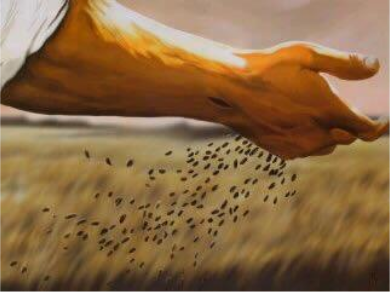The Mustard Seed and the Leaven
Matthew 13:31–32 (see also Mark 4:30–32, Luke 13:20–21)
Another parable He set before them, saying, The kingdom of the heavens is like a grain of mustard seed, which a man taking sowed in his field, which indeed is the least of all seeds; but when it is grown, it is greater than the herb, and becomes a tree, so that the birds of the heaven come and nest in its branches.
Another parable He spoke to them: The kingdom of the heavens is like leaven, which a woman taking hid in three satas1 of meal, till the whole was leavened.
The least of all seeds
AC 55.3. The earth is replenished or filled when there are many truths and goods. For when the Lord blesses and speaks to man, that is, works upon him, there is an immense increase of good and truth, as the Lord says in Matthew 13:31–32....
A “grain of mustard seed” is man’s good before he becomes spiritual, which is “the least of all seeds” because he thinks that he does good of himself, and what is of himself is nothing but evil. But as he is in a state of regeneration, there is something of good in him, but it is the least of all.
The second rational and the mustard seed
AC 2657.4. How the case is with these things may be illustrated by comparison with the fruit of trees. The first rational, in the beginning, is like unripe fruit, which gradually matures till it forms seeds within itself, and when it is of such age as to begin to separate itself from the tree, its state is then full (see above, n. 2636). But the second rational, with which one is gifted by the Lord when he is being regenerated, is like the same fruit in good ground, in which those things which are round about the seeds decay, and the seeds push forth from their inmost parts, and send out a root, and then a shoot above the ground, which grows into a new tree, and unfolds itself at length even into new fruits, and then into gardens and paradises, according to the affections of good and truth which it receives (see Matt. 13:31–32; John 12:24).
The birds of heaven
AE 1100.8. “A tree from a grain of mustard seed” signifies a man of the church, and also a church beginning from a very little spiritual good by means of truth. For if only a very little spiritual good takes root with a man, it grows like a seed in good ground. And as a “tree” thus signifies a man of the church, it follows that “the winged things of heaven” that made nests in its branches signify the knowledges of truth and thoughts from them. Anyone can see this is not a mere comparison, for if it were, what would be the need of such things in the Word and of like things in the Prophets?
Leaven
DP 25. The union of good and truth in others is provided for by the Lord by means of purification; and this is brought about in two ways, one by temptations, and the other by fermentations.
Spiritual temptations are nothing else than combats against evils and falsities which emanate from hell and make their influence felt. By these combats man is purified from evils and falsities, and good is united to truth in him, and truth to good.
Spiritual fermentations are brought about in many ways, both in the heavens and on the earth; but in the world it is not known what they are and how they are brought about. For there are evils together with falsities which, when introduced into societies, act like ferments put into meal and new wine. By means of these, discordant things are separated and concordant things are conjoined, and purity and clearness are the result. They are what are meant by these words of the Lord [in the parable of the leaven] ....
1 AC 7906:3 (in the Latin) uses the Greek word “sata” here, from the Hebrew seah. A “sata” is about 1.5 pecks.
Questions and Comments
- According to https://www.britannica.com/plant/mustard, a mustard seed is about 2.5 mm in diameter.
- It says in AC 55.3, “when the Lord blesses and speaks to man, that is, works upon him, there is an immense increase of good and truth.” This seems to be reason for hope in any circumstance we may find ourselves in.
- The first rational is compared to unripe fruit in AC 2657. How does that help us understand why we need to move beyond the first rational into the second rational?
- What is an example of “an evil injected into society” that acts like a ferment, as mentioned in DP 25?
| previous |  |
next |
|---|


